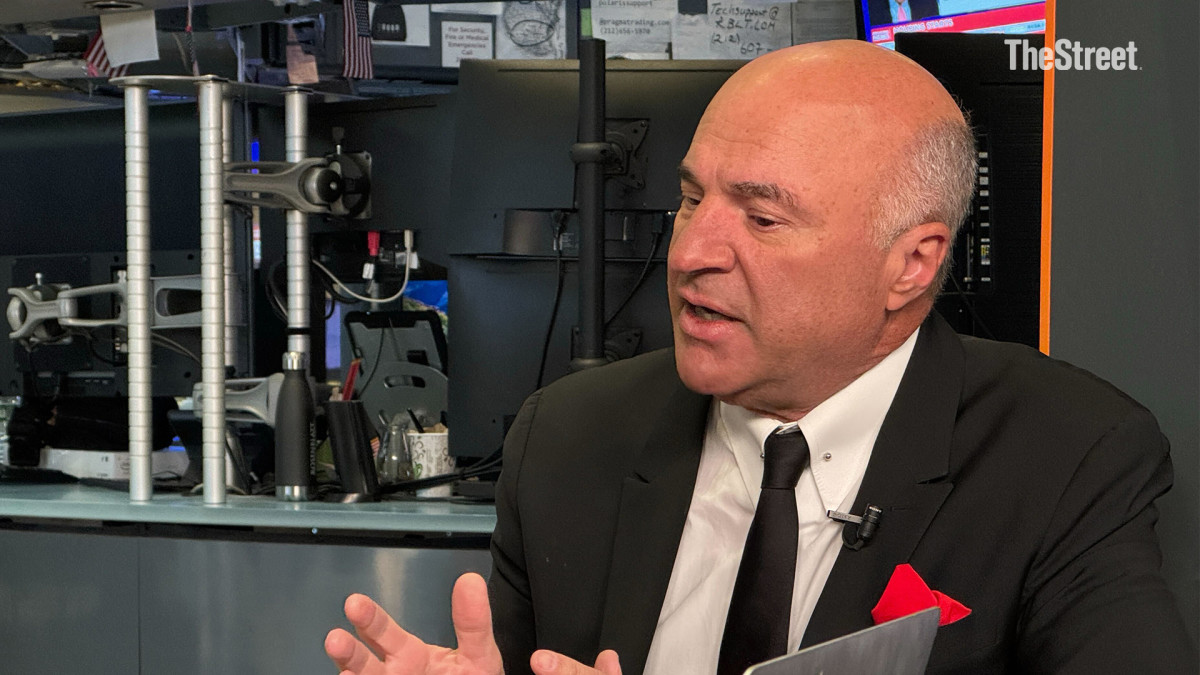Shark Tank's Kevin O'leary Sends Major Message On Social Security

As U.S. workers focus on short-term everyday expenses such as home payments, car expenses, phone charges and groceries, many also wonder how much they should set aside to save and invest for retirement.
Kevin O'Leary, the prominent entrepreneur who regularly appears on television as a key investor on ABC's Shark Tank show, delivers an important assertion about Social Security and the amount of money people need in retirement in addition to the federal program's monthly paychecks.
????????Don't miss the move: Subscribe to TheStreet's free daily newsletter????????
O'Leary highlights an important truth: Social Security payments were never designed to fully support retirees as their sole income source.
Given the average monthly payout is roughly $1,900 — amounting to about $23,000 annually — it falls short of ensuring the comfortable retirement to which people aspire.
To create a more stable financial future, workers often turn to employer-sponsored 401(k) plans, which frequently include company matching contributions, offering an added incentive.
Related: Scott Galloway sends strong message on Social Security, boomers
Contributions to traditional IRAs are made with pre-tax dollars, meaning retirees owe taxes on withdrawals during retirement.
On the other hand, Roth IRAs require taxes to be paid upfront on contributions, enabling retirees to make withdrawals tax-free later in life.
Taking these factors into account, O'Leary provides additional guidance on Social Security payments and other income during retirement.
Shark Tank's Kevin O'Leary talks with TheStreet at the New York Stock Exchange. O'Leary explains his views on Social Security, including how much money a retiree needs in addition to the federal program's monthly paychecks.Image source: TheStreet
Kevin O'Leary explains the role of Social Security and the antidote to panic
Because Social Security monthly benefits aren't enough to cover expenses for a comfortable retirement, O'Leary addresses the question many people have: How much is needed to live well on when one retires?
"So how much do you really need? And when should you panic?" he asks. "First of all, you need less than you'd imagine, and panicking helps nothing. The best antidote to panic is realism. If you hit the age of sixty-five in good health, life is just going to be a lot cheaper to live. If you're realistic."
In his book Cold, Hard Truth on Men, Women & Money, O'Leary cites experts who suggest that retirees should need about 65% of the amount of their gross salary at the time they stop working.
To simplify the calculation, use a clear, round figure. For example, if an individual currently earns $100,000 annually, they would require $65,000 in the first year of retirement to cover expenses. This estimate takes into account the support provided by Social Security benefits.
Because the average Social Security benefit is about $23,000 annually, a person can imagine that, according to this approach, they would need an additional $42,000 per year.
More on retirement:
- Shark Tank's Kevin O'Leary delivers strong words on 401(k)s, recession
- Dave Ramsey cautions U.S. workers about Social Security
- Jean Chatzky warns Americans on Social Security, retirement money
"This assumes that you will want to maintain roughly the same standard of living that you enjoyed when you worked a stressful life, working forty hours a week away from home," O'Leary wrote.
"Of course, you ate out a lot, bought hardcover books to read on the subway, and got a brand-new coat every winter," he continued. "But in retirement, you won’t need to finance your lifestyle in the same way. There will be no commuting, fewer lunches out, and lower dry-cleaning bills."
Related: Shark Tank's Kevin O'Leary sends strong message on 401(k)s, recession
Kevin O'Leary discusses expenses while collecting Social Security benefits
When one begins collecting Social Security benefits and is living off those as well as other income saved during their working years, it becomes necessary for them to adjust their spending habits.
"If you don’t think you can go days without spending money on useless crap like magazines, gum, or coffee, then you’re going to be in trouble a few years into retirement," O'Leary wrote. "If you're healthy and happy, being old is cheap. Walking, working part-time, and living a life of purpose and meaning don’t require a lot of money, just planning and discipline."
"So yes, spend those last few working years socking away as much money as you can, but also use those years to practice living on a lot less, lowering your expectations, and cultivating disciplined spending habits," he added.
O'Leary also emphasizes the importance of getting out of debt before retiring.
"If you’re heading toward retirement with debt, now’s the time to budget like you’ve never budgeted before. I mean it," he wrote.
"Don’t retire until you can afford it. Throw out your plan for freedom at fifty-five or even sixty-five," O'Leary added. "If you have debt, you need your job, so you have to do everything in your power to keep it."
"Get a part-time job, too, while you’re at it and while you’re still spry enough to handle it."
Related: Veteran fund manager unveils eye-popping S&P 500 forecast
Popular Products
-
 Put Me Down Funny Toilet Seat Sticker
Put Me Down Funny Toilet Seat Sticker$3.99$1.78 -
 Stainless Steel Tongue Scrapers
Stainless Steel Tongue Scrapers$24.99$16.78 -
 Donut Hemorrhoid Memory Foam Seat Cus...
Donut Hemorrhoid Memory Foam Seat Cus...$58.99$40.78 -
 Stylish Blue Light Blocking Glasses
Stylish Blue Light Blocking Glasses$61.99$42.78 -
 Adjustable Ankle Tension Rope
Adjustable Ankle Tension Rope$37.99$25.78